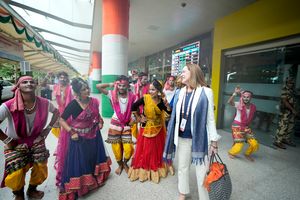The fourth and final G20 Culture Working Group (CWG) meeting ended in Varanasi on August 26. The other three sessions were held in Khajuraho, Hampi and Bhubaneswar. The cities were strategically selected to showcase the ancient cultural heritage to member countries in an attempt to promote our cultural soft power. We have failed to market ourselves well, and with these meetings, we have tried to amend our ways a bit.
Four thematic priorities were set forth by India to frame the work of the CWG, addressing: protection and restitution of cultural property; harnessing living heritage for a sustainable future; promotion of cultural and creative industries and creative economy, and leveraging digital technologies for the protection and promotion of culture.
India deliberated on these four priorities as these are favourable to the world as a whole. The major theme was ‘Vikas bhi Virasat bhi’—development with preservation of our heritage is what we believe in and are putting forth. These are the major priorities on the lines of which the outcome document has been signed by the member countries.
In the outcome document called the Kashi Culture Pathway, members committed to advancing the return and restitution of cultural property as an ethical imperative of social justice and called for a strengthened global coalition to bolster the fight against illicit trafficking. It also called for strengthened and better aligned policy frameworks, that address the misuse and misappropriation of living heritage through a more robust dialogue and policy engagement, including on issues pertaining to over-commercialisation and intellectual property, thus acknowledging the cultural rights of the bearers of this living heritage. The members also committed to work towards strengthening and aligning conceptual and monitoring frameworks of the creative.
The member states have agreed to be committed towards strengthening preventive action and regulation of online trade of cultural property through: (i) the implementation of existing international standards as applicable; (ii) enhanced knowledge sharing and expertise across the G20 membership; (iii) the development and implementation of guidelines for online trading platforms and social media; (iv) the dissemination of standards and best practices to support self-regulation; (v) sustained collaboration with international organisations; and (vii) the reinforcement of anti-money laundering regulations related to cultural property.
It was decided that an open and inclusive dialogue on the return and restitution of cultural property, building on a broad historical perspective that renews relationships between countries and enabling alternate dispute resolution mechanisms, as appropriate will be supported by all member states.
We have reached a consensus to strengthen institutional and policy frameworks to leverage living heritage for sustainable development by supporting ratification and implementation of international agreements, conventions and frameworks, bolstering measures for heritage preservation and language transmission and expanding evidence-based understanding of living heritage’s contribution to various sustainable development areas, with an emphasis on research, knowledge sharing and digital technology utilisation.
Not only these, the cities for these G20 CWG meetings were chosen strategically so that the member states could see the kaleidoscope of culture that India is. When they visited these places they would have experienced the rich diversity of our country not only in the conference halls, but also in attire, food, language, architecture and handlooms. The G20 is a great platform to market ourselves well and we have done just the same with these meetings.
The outcomes of these meetings have been phenomenal and we have put forth our voice in a way the world has listened and acted upon.
Lekhi is Union minister of state for external affairs and culture.


